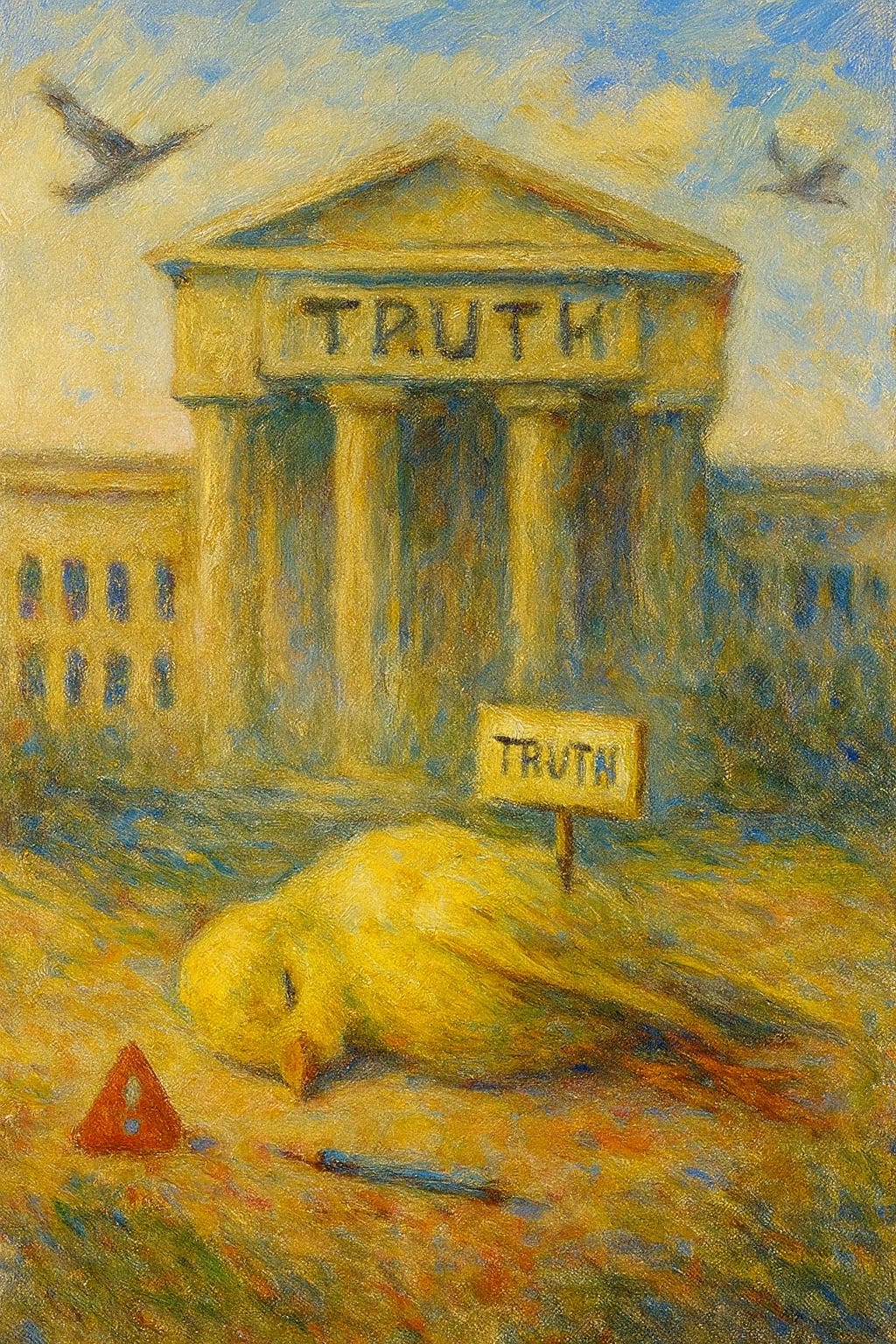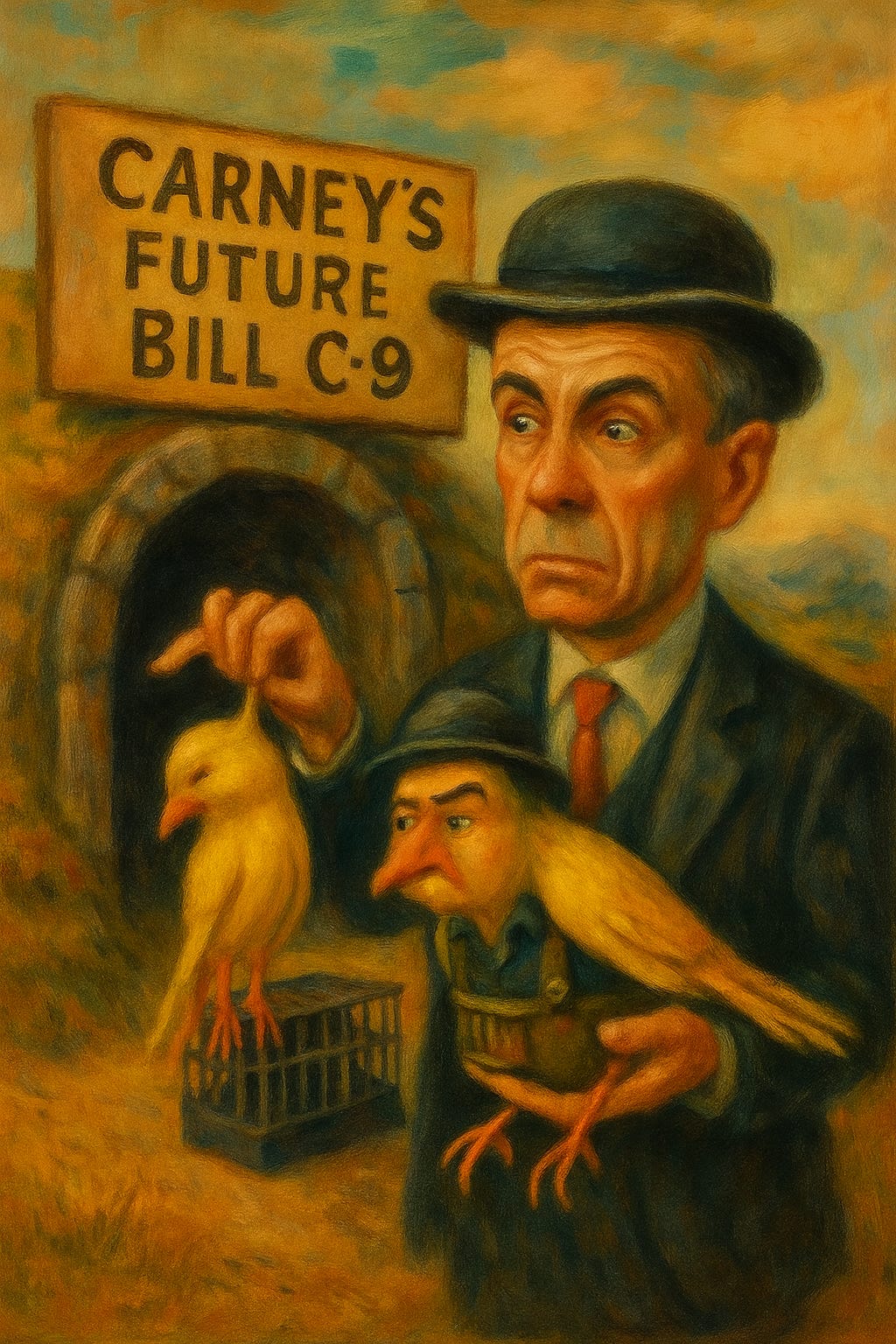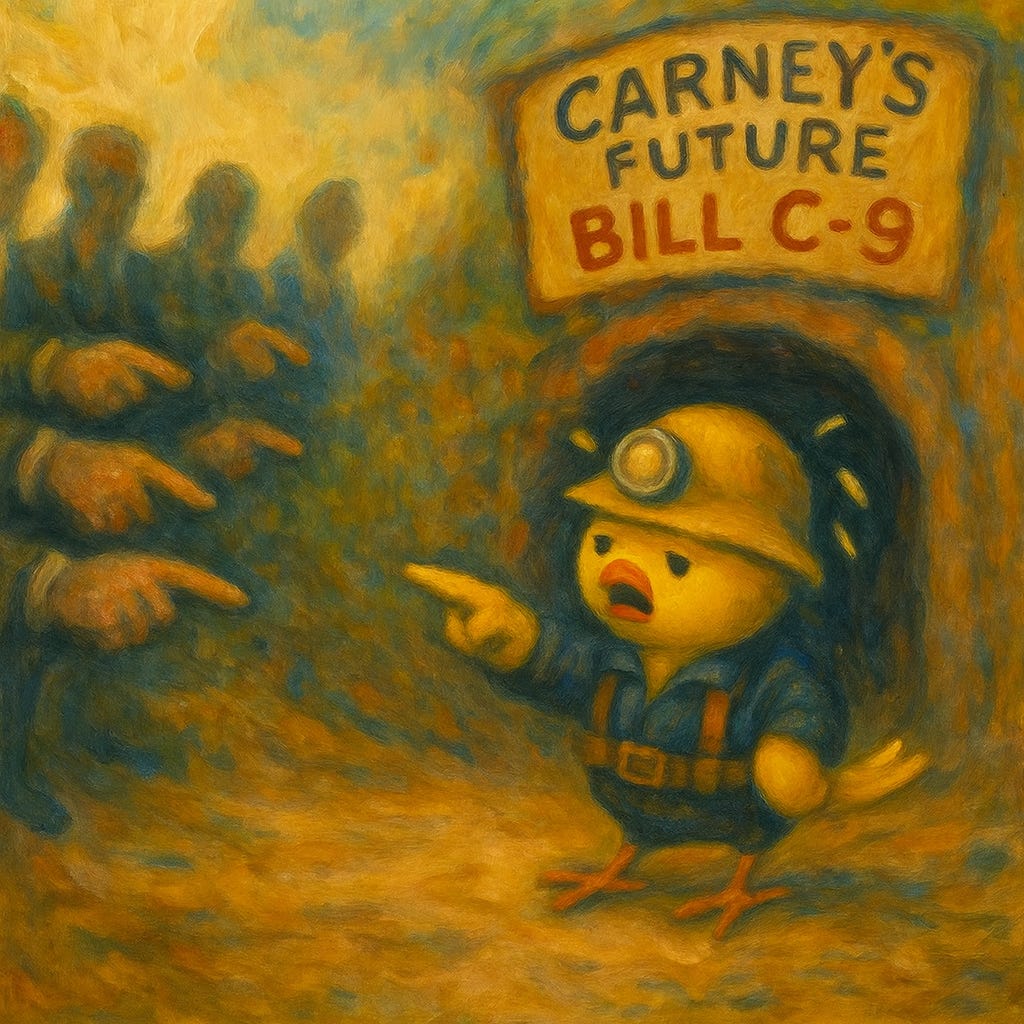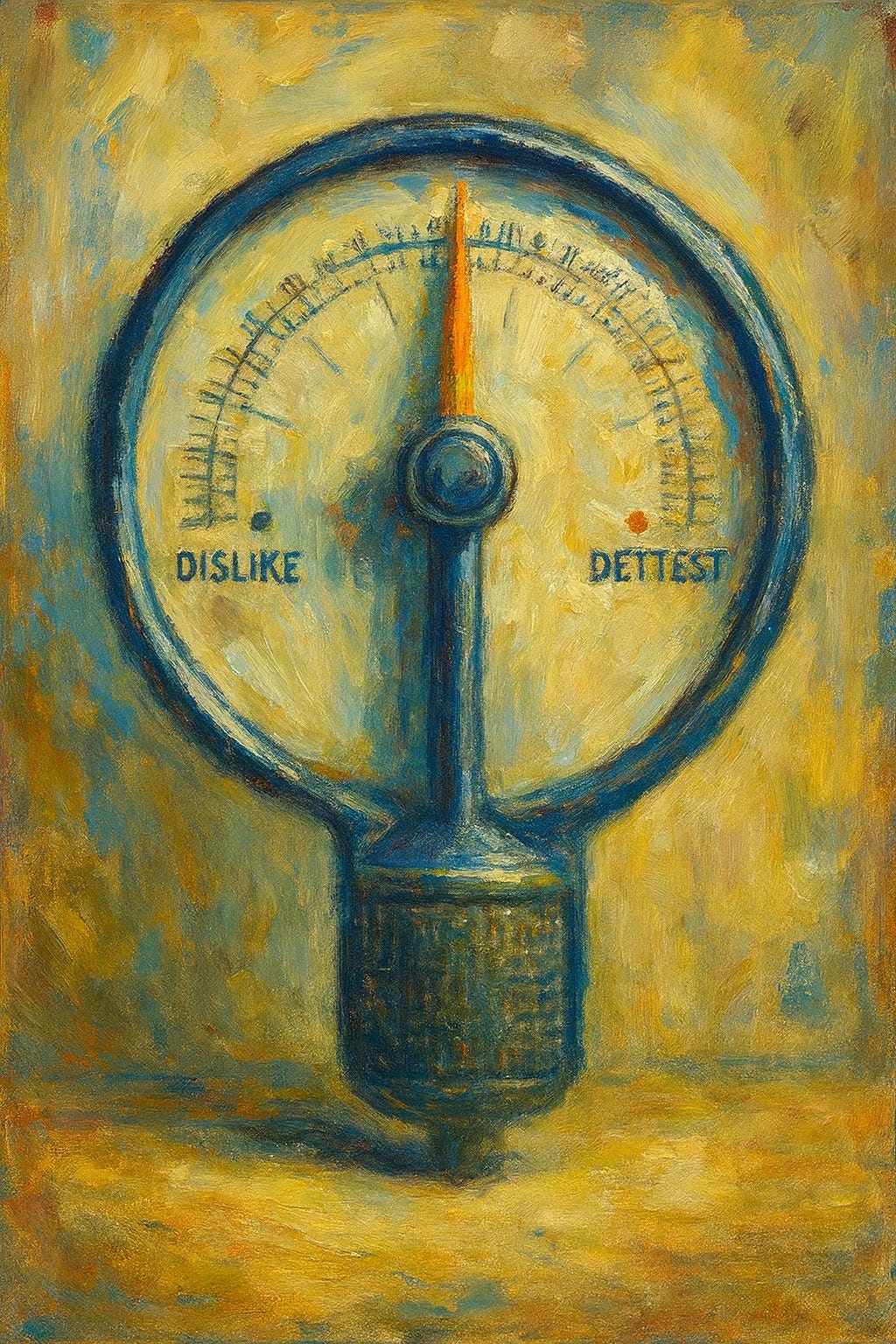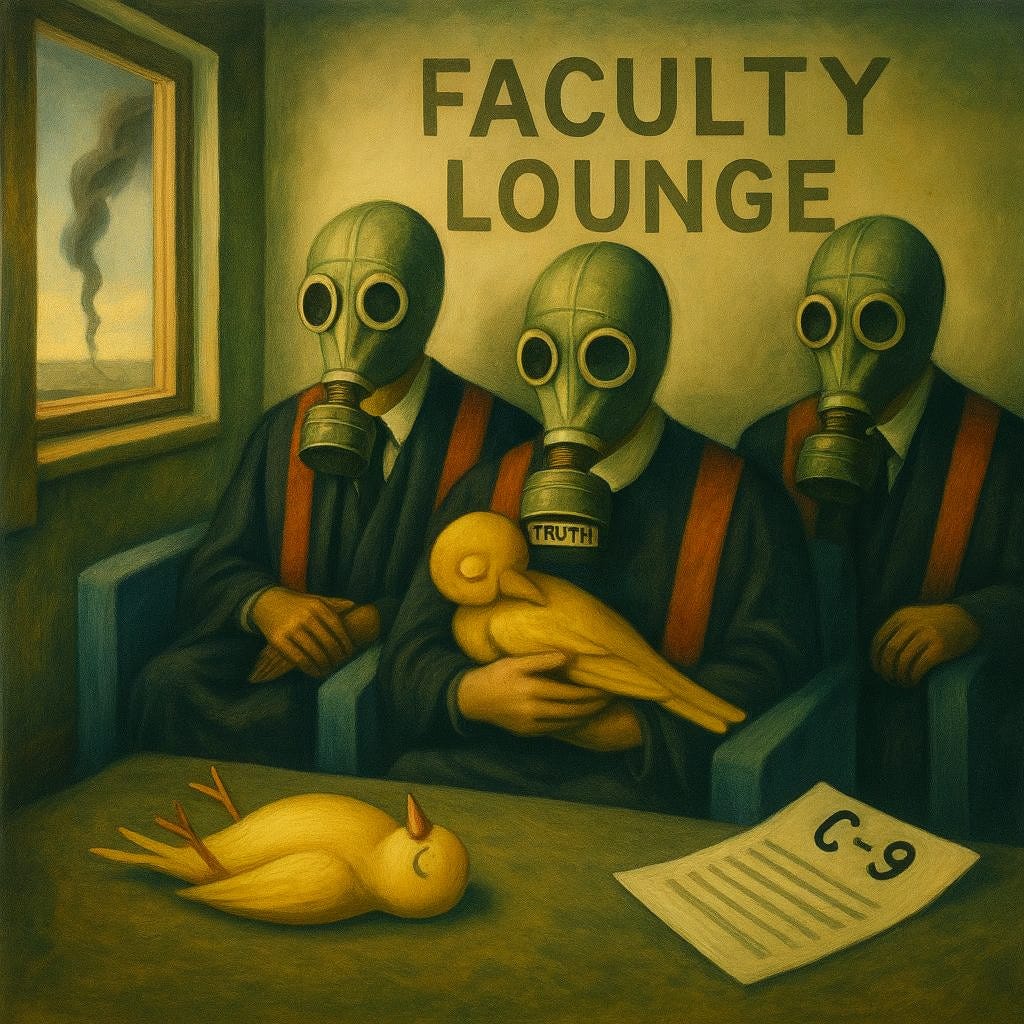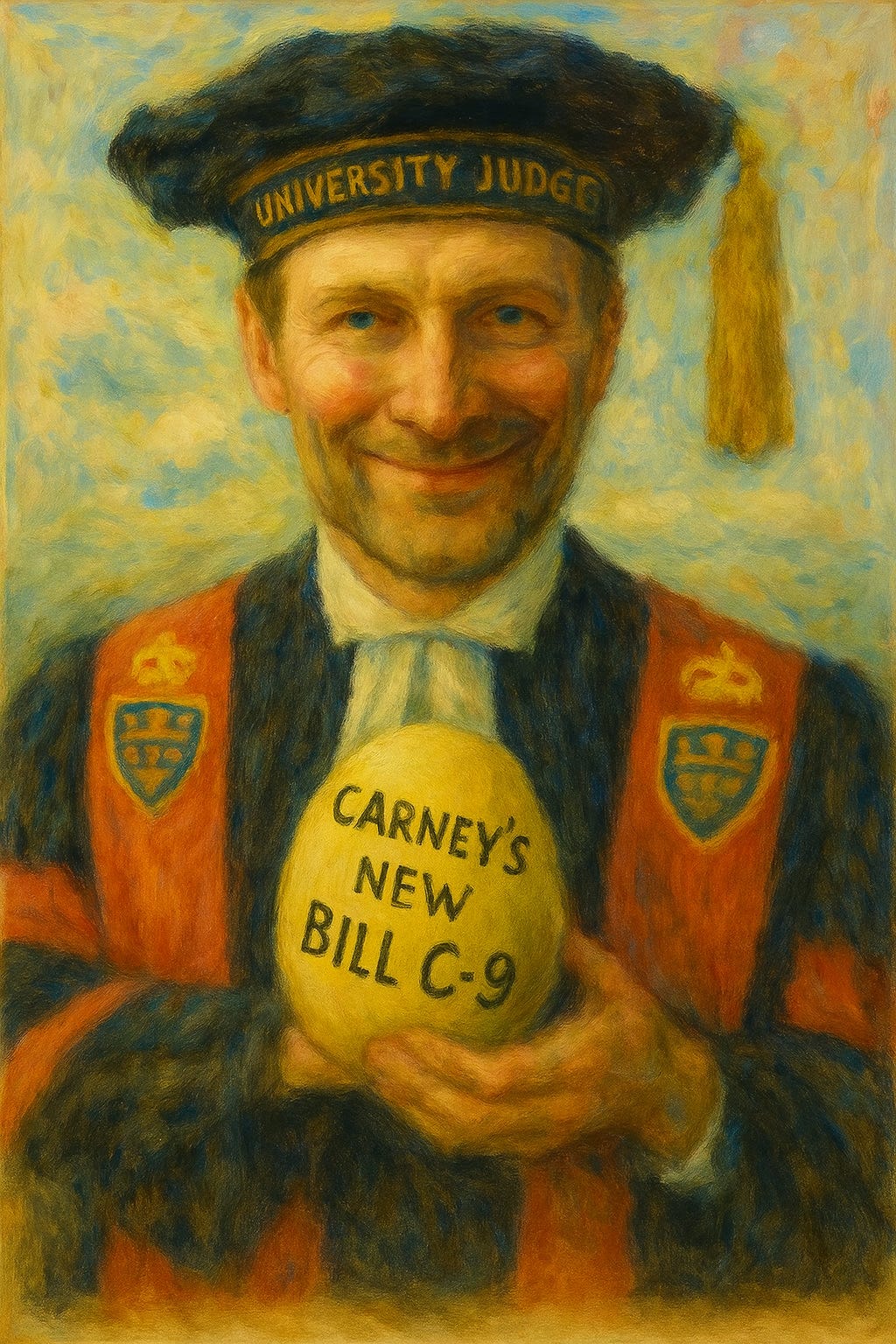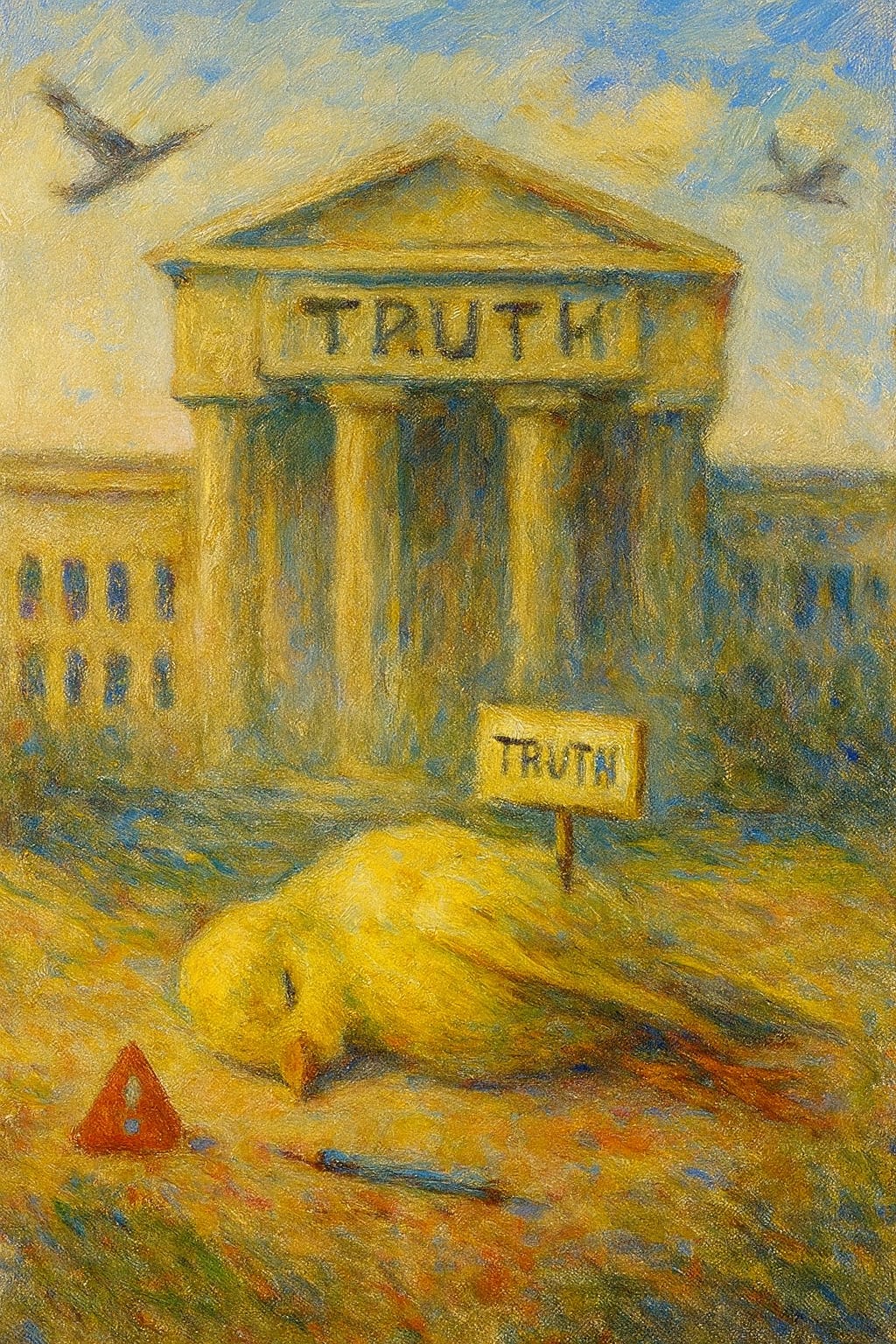Bill C-9: The Liberal Love-Child of Orwell and Monty Python
Billed as protection from “harm,” this bureaucratic farce would make satire redundant and free speech extinct.
(If the pining for the fjords reference leaves you confused, you are probably under 40. See comedy sketch in footnote 1)
If you believe in the importance of free speech, subscribe to support uncensored, fearless writing—the more people who pay, the more time I can devote to this.
Please subscribe to receive at least three pieces /essays per week with open comments. It’s $6 per month, less than USD 4. And now take 50% off.
Everyone says, "Hey, it’s just a cup of coffee," but please choose my coffee when you come to the Substack counter. Cheers.
The canary in the coal mine was never a mascot, nor was it a cute Victorian pet brought along to cheer the miners’ spirits.
It was there for one grim, contractual purpose: to die first. One little puffed-up corpse, lungs seared by gas, was your cue to stop digging and start running.
Fast-forward to the modern intellectual coal pits—our universities—and the scene is eerily familiar. The air is thick with something far more noxious than methane: censorship, procedural abuse, and the sort of rights violations that arrive in memo form. You can count the canaries on their backs—if you can still make them out beneath the paperwork.
The cage is still there, but now it is being examined in Ottawa by the new Canadian PM, Mark Carney.
Bill C-9 seems destined to be being fondled back to life (formerly Bill C-63) by the Liberals with the unctuous optimism of a Monty Python shopkeeper insisting that his Norwegian Blue is not dead, merely “pining for the fjords.”
And the sales pitch? Oh, it will be sold like a box of fair-trade organic virtue: “Protecting children” and “eradicating hate.” And someone will say, “You’re against the new version of Bill C-9? What do you like about paedophilia?”
Be very suspicious when any tear-filled censor starts blubbering about the children.
All very noble, until you notice what’s in the fine print—an enforcement model borrowed straight from university and college campus kangaroo courts. Think subjective definitions of “harm,” grievance-driven investigations, anonymous denunciations, and outcomes that are as politically pre-ordained as a Soviet show trial.
Carney’s potential new bill and accompanying legislation will easily become a career-ending, wallet-draining, jail-sending vending machine, stocked with legal cudgels and set to “free to toss out anonymous accusations” for your ideological enemies.
It may be delivered with all the dull woodenness of bureaucratic cruelty, but it could do immense harm to Canadian free speech.
You won’t need to have committed any actual crime—only to have said the wrong thing in the wrong decade, as determined by the mood of the moment.
Under Carney’s Bill C-9, the canary won’t even be given the dignity of keeling over in peace. It will be paraded as proof that the mine is “safe,” while behind it, the tunnel collapses on anyone still foolish enough to believe in open discourse.
The canary isn’t pining for the fjords—it’s warning you to run. And this time, it’s not just the mine that’s in danger; it’s free speech. Such a bill would be that dangerous.
The original Trudeau C-63, with a name that sounded like a minor Star Wars droid, never made it past Parliament’s gates—it keeled over in January 2025 when Trudeau prorogued the place.
But what it proposed was already alive and wheezing in academia: a system of subjective enforcement, kangaroo-court procedure, and virtue-signalling jurisprudence that has been beta-tested for years without the bother of voter oversight.
Bill C-9 would not be so much a shield against “harm” as a bludgeon against the kind of speech that makes the self-appointed moral guardians twitch with excitement.
If Carney’s resurrection project succeeds, the mechanics are worthy of satire. A stray remark online, past or present, deemed “hateful” by an anonymous busybody could be enough to haul you into a Human Rights Tribunal—retroactively.
The accuser? Safely hidden behind anonymity, with no cost to their crusade. The accused? They are on the hook for their lawyer; the feds will pick up your accuser’s tab, and you will end up jousting with shadows.
And the standard of proof? Forget “beyond a reasonable doubt”; this is “balance of probabilities,” the judicial equivalent of a coin toss.
The punishments are draconian in that curiously Canadian way—delivered with a smile and a hint of sanctimony. Life imprisonment (yes, life) for “advocating genocide,” a term elastic enough to wrap around any political disagreement the Tribunal dislikes.
Ah, the exquisite irony of it all—could “advocating genocide,” as vaguely scrawled into the feverish text of Bill C-9, be twisted to encompass the mere act of standing up for Israel’s right to exist?
One shudders at the prospect, for in the hands of these modern inquisitors, the line between defending a democracy against its would-be annihilators and cheering on mass murder becomes as blurred as a drunkard’s vision after a long night at the trough of self-righteousness.
And let us not forget the spectral hand guiding this farce: the infamous dictum of Joseph Goebbels—for those blissfully uninformed, he was the Nazi regime’s Minister of Propaganda, a diminutive fanatic with a clubfoot and a doctorate in literature, who served as Adolf Hitler’s chief mouthpiece from 1933 until he poisoned his children and shot himself in the Führer’s bunker in 1945.
Goebbels, that virtuoso of venom, popularised the “big lie” technique: repeat a falsehood with sufficient bombast and frequency, and the masses will swallow it whole, mistaking repetition for truth. Melanie Joly said approximately the same thing.
The old Bill C-63 was intended to impose fines of up to $70,000 for lesser blasphemies, plus an additional $20,000 to be given to the offended party for their trouble. It is, in essence, the criminalisation of “wrong vibes.” It could be a very lucrative snitch program.
And it is not speculative. We’ve already seen this culture in miniature on campus—“non-disciplinary” punishments that socially decapitate you without leaving a legal mark—ostracism as policy. Guilt presumed, defence denied, and a tribunal more interested in your tone than your evidence. That’s if they ever listen at all; usually it’s predetermination and Potemkin theatre.
It’s what happens when feelings become legal tender and truth is a depreciating asset.
So here we are, squinting at the canary—head tilting, feathers ruffled, gasping faintly. The prideful miners above ground will insist it’s not dying at all, merely “resting” or “pining for the fjords.” But you’d better believe the gas is real, and it’s creeping up the shaft.
I’ve witnessed firsthand the effects in the bill’s beta-testing grounds—the shadowy realm of university human rights departments—where these commissars exhibit a curiously selective tolerance for actual human rights violations.
You see, their decisions depend on whether you’re sporting the right team colours.
At numerous universities, and in my experience at the University of Guelph and Humber College, it’s been open season on Jews since the post-October seven frenzy, with encampments spewing bile, professors peddling ancient blood libels, and the human rights folks suddenly struck by sporadic deafness when the outrage rolls in.
Take my sorry saga: for the high crime of standing with Israel and dubbing Hamas the Nazis they emulate, I was tarred with anonymous shrieks accusing me of everything from wounding some sky daddy’s honour to being a violent criminal and pedophile—slurs flung by phantoms I’d never met, with zero evidence required.
The equity office harpies and management gave defamation the green light, letting it fester campus-wide, all while ignoring the real hatemongers in their midst.
And speaking of those charmers, it’s downright peculiar how Peel Regional Police have been probing Guelph professors for hate propaganda—broad-brush smears celebrating Oct. 7, or accusing “the Jews” of sparking World War II or orchestrating the Holodomor famine in Ukraine and Russia (fun fact for the historically challenged: that was Stalin’s handiwork, not some shadowy cabal).
Yet, as long as these accused academics flaunt the same progressive stripes as management and the human rights squad, at my ex-university anyway, any complaints lobbed their way vanish into the ether, uninvestigated and unlamented.
I was fired for the hate crime of poisoning the university environment because I called Hamas Nazis.
To repeat, my accuser called Jews filth, subhuman and devil worshippers, and hundreds of things worse, but strange, the Humber and Guelph Human Rights Manager said, “no problem.” That is what happens with “human rights” and censorship: they morph into strictly the latter.
It’s a masterclass in double standards: secret courts where evidence is optional, proceedings shrouded in anonymity, and verdicts handed down on the whim of ideological alignment rather than facts.
Human beings, being the flawed, tribal creatures we are, Carney’s shiny new variant of Bill C-9 would inevitably devolve into the same farce—scaling up the campus kangaroo courts to a national spectacle.
Vague, malleable rules enforced by unelected motive-readers who play favourites? It’s not justice; it’s a power grab dressed in virtue, chilling speech for the many while winking at the sins of the favoured few.
If this is the Liberal vision of “safety,” count me out—I’ll stick with the canaries, who at least die honestly when the air turns toxic.
And here’s the kicker—it’s retroactive! Dig up your old tweets from a decade ago, dust off that cheeky Facebook post from your misspent youth, and voila, you’re hauled before a Human Rights Tribunal for thought crimes committed before the law even existed.
Anonymous complaints? Check. Vague definitions of “harmful content” that could snare everything from robust debate to a poorly timed joke? Double check.
The result? A chilling effect that turns Canadians into self-censoring sheep, whispering their opinions in dark alleys lest the digital Stasi come knocking. Look at the shameful English bobbies right now.
Free speech isn’t just damaged; it’s disembowelled, left bleeding on the altar of “safety,” where the only safe speech is no speech at all.
If C-9 or a new variant passes in its current form, expect the road to “Safety” to run straight through Utopia—a place whose chief export is moral bankruptcy.
The bill reeks of utopian hubris: panels of motive-readers parsing the difference between “dislike” and “detest,” then handing down sentences accordingly. Don’t worry—the Human Rights Commission will get it right.
They’ve never botched a thing in their lives, except every time they’ve ever done this.
It’s the arrogance of elites who fancy themselves omniscient guardians of the public mind, convinced they can police the infinite sprawl of the internet without trampling on liberty or inviting abuse from the very power-hungry types who draft such nonsense.
Hubris, thy name is Carney and Bill C-9.
Saint Paul once mocked religious bigots who judged by outward piety. Swap the priests for faculty lounge inquisitors, and you’ve got the modern scene. I suspect even Jesus would get life under C-9—probably for offending the money-changers.
And while this bill isn’t yet parading through Parliament, Carney’s openness to it and his tendency to believe that he is always and will forever be the smartest guy in the room are frightening.
So who’s the dead canary here? On campus, we’ve already lost entire flocks. Pride in our righteousness has blinded us to the gas leak.
It’s the perfect storm of cowardice and caprice: accusers hiding in the shadows, bureaucrats nodding along with virtuous glee, and the accused left twisting in the wind. And this, my friends, is the rotten core of “human rights” enforcement in action—the very blueprint for Bill C-9 or whatever mutant variant the Trudeau-Carney cabal dreams up next.
Vague, elastic standards around buzzwords like “safety,” “offence,” and “harassment” aren’t safeguards; they’re weapons, stretched and twisted to fit whatever political grudge is in vogue.
It’s pre-judgment masquerading as justice: decide who is the villain, then retrofit the rules to nail him or her to the wall.
No wonder the whole enterprise reeks of hubris—the arrogant assumption that a cadre of motive-divining mandarins can police speech without descending into farce or tyranny. They’ve been practising on campuses for decades, and now they want to scale it up nationwide. If this is progress, I’ll take the coal mine, canaries and all.
University human rights administrators should be proud—they’ve been administering justice without evidence for long before Ottawa formalised it. Bill C-9 explicitly stated that the Digital Safety Commission “is not bound by any legal or technical rules of evidence.”
Reason? Optional. After all, why consult dull legal safeguards when Mrs Williams from Human Rights took an online course in body language detection and can sniff out guilt by examining your body language or an eyebrow twitch?
Complainants get anonymity, of course. With the right activist forums sharing your photo and contact info, strangers are a copy-and-paste away from accusing you of anything from puppy-kicking to starting the plague.
When you suggest maybe the rules should be followed, the response is less “Twelve Angry Men” and more “Twelve TikTok-addled kittens startled by a bug zapper.”
And with C-9’s toddler-level evidentiary standard looming, the process will only get worse. A cough, a nervous glance, or simply being disliked by the investigator could be enough to tip the 51% scale. Then you’re on a fast track to whatever bureaucratic purgatory they’ve designed for the unlucky.
Andrew Coyne notes that C-9’s evidentiary rules are unlike anything in our courts. That’s putting it gently. The bill’s premise is simple: it’s easier to secure a guilty finding when you make the definition of “proof” a mode.
If you want to know what a new variant of Bill C-9 will look like in practice, don’t ask the government. Talk to a dead campus canary.
They’ll tell you what happens when hubris dresses up as justice. And if you can’t find one, just wait—under this model, there’ll be plenty more. I’ve seen more than a few.
If you found value in this article and wish to support my ongoing work, please consider leaving a tip. Your support helps me continue producing uncensored content on critical issues.



